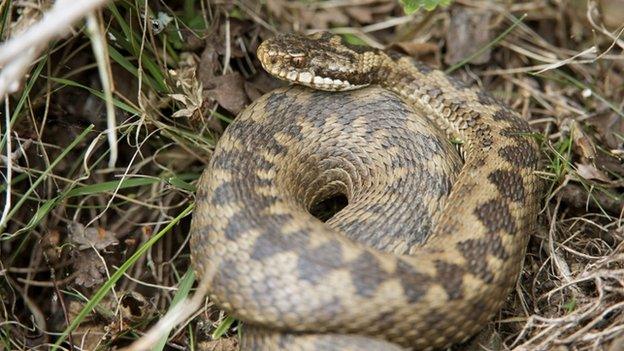Guide: What to do if a snake bites you
- Published

The adder is Britain's only venomous snake found in the wild
Snake bites in the UK are rare and when they do happen, are usually not serious. Read our guide on what to do if you do get bitten.
Why do snakes bite?
When a snake bites and injects venom, its aim is usually to paralyse its prey.
Humans are too big for snakes to eat, so the reptiles will only bite people in self-defence.
This can happen if they are disturbed (often accidentally, by someone stepping on one) or made angry (by someone playing with one).
Sometimes snakes can bite without injecting any venom - this is called a 'dry' bite.
Snake bite symptoms
If someone is bitten by an adder and injected with venom, there can be serious symptoms such as:
Redness and swelling around bite
Feeling of sickness
Vomiting
Dizziness
A bite from a foreign or exotic snake may also cause shock and leave the person unable to move their muscles.
If it's a 'dry' bite then it may cause mild pain from the snake's teeth and a feeling of worry and fear.
How common are snake bites?
Across the world, there are about 5.5 million snake bites every year, which lead to between 20-125 thousand deaths.
Most deaths happen in remote parts of countries where there is limited or no access to medical care.
In the UK, there are only about 100 adder bites reported each year.
What to do if you're bitten
Remain calm and do not panic
Try to remember the shape, size and colour of the snake - identifying it can help with treatment
Don't try to suck or cut out the venom
Don't wrap anything around the bitten limb, such as a tourniquet
Don't rub anything into the wound
Remove any jewellery and watches from the bitten arm or leg
Get medical attention - head straight to your nearest A&E or dial 999 if it's an emergency
